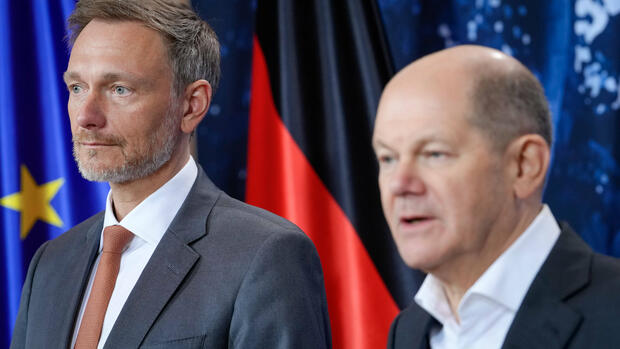Berlin Olaf Scholz (SPD) personally intervenes in the budget dispute in order to push through the austerity package planned by Christian Lindner (FDP) in the coalition. The Chancellor and Finance Minister would now conduct the budget talks together, the Handelsblatt learned from government circles. Meetings are planned with half a dozen cabinet members.
It is extremely unusual for a chancellor to conduct budget negotiations personally. The process makes it clear how divided the traffic light coalition is on the budget for the coming year. Finance Minister Lindner considers savings to be essential in order to comply with the debt brake. On the other hand, the Greens and parts of the SPD have criticized the FDP leader for the austerity course.
In the past few weeks, Lindner had sent letters to every minister in which he stipulated the maximum amount of money the department could spend in the coming year. With the exception of the Department of Defense, all houses must make savings. Lindner wants to raise almost five billion euros in this way.
However, the cuts vary from ministry to ministry. They should primarily affect the so-called disposable expenses, such as funding programs. Investments or social expenditures for which legal rights exist are exempt.
However, not all cabinet members wanted to accept the spending limits, around half a dozen have reported a need for discussion, according to government circles. These should include Foreign Minister Annalena Baerbock, Family Minister Lisa Paus (both Green) and Interior Minister Nancy Faeser (SPD). But Transport Minister Volker Wissing (FDP) should not be satisfied either.
Differences in budget policy between the FDP and the Greens
The ministers now do not have to negotiate with the finance minister, as is usually the case, but also with Chancellor Scholz. Lindner had already coordinated the savings bonds with Scholz. This shows that the FDP finance minister and, above all, many Green ministers are so far apart when it comes to budgetary policy that no agreement is possible without the chancellor intervening.
.>> Read here: The standstill coalition – with these projects, the traffic light blocks itself
All ministers who do not want to accept their spending ceilings must now knock on the door of the chancellery. Scholz and Lindner then conduct the talks together. The first are said to have already taken place, and more will follow in the next few days.
The ministers, who are unwilling to make savings, cannot hope for much concession. According to information from the Ministry of Finance, there is a financial gap of around 20 billion euros in the 2024 budget. The savings that Lindner has prescribed to the ministries should bring in almost five billion euros.
This is to save money
There are already plans as to how the remaining 15 billion euros are to be raised. So Lindner wants to cut subsidies. This is also provided for in the coalition agreement. However, there has recently been a dispute between the SPD, Greens and FDP as to which financial aid can be reduced.
The Greens want to abolish the commuter allowance, increase taxation of company cars or abolish tax breaks for diesel and kerosene.
(Photo: AP)
The Greens want to abolish the commuter allowance, increase taxation of company cars or abolish tax breaks for diesel and kerosene. The Liberals reject that. Changes to these controversial subsidies are unlikely, with the Treasury presumably planning cuts to smaller subsidies.
The federal government also wants to reduce financial support for the states. According to Schleswig-Holstein’s Minister of Finance Monika Heinold (Greens), Lindner wants to cut the funding of federal and state programs by at least 900 million euros. The program for coastal protection is affected. From a federal perspective, this is a task for the federal states.
There was prompt criticism of this, for example from Baden-Württemberg’s finance minister Danyal Bayaz (Greens): “At the finance ministers’ conference, the federal and state governments recently agreed that the current major challenges could only be mastered together. The financial commitments of the federal government to care for refugees must not be cut back in other joint projects a blink of an eye later.”
Another measure to close the gap in the budget: Some investments in the field of energy and climate protection should no longer be paid from the core budget, but from a special pot, the so-called climate and transformation fund (KTF). In the KTF, too, money is tight in the medium term. However, expenses can be reallocated in the short term.
And finally, Lindner should plan in the budget with a so-called global underspending (GMA). This has repeatedly been included in the budget in recent years.
These are flat-rate savings, of which it is still unclear exactly where they will come from. Background: Part of the planned expenditure, for example for certain investments, is regularly not paid out because the projects are delayed.
Overall, all measures together should be sufficient to close the financial gap of 20 billion euros. This means that the draft budget could be approved by the Federal Cabinet at the beginning of July and thus before the parliamentary summer recess.
>> Read here: Cutback plans are causing tension in the traffic light coalition
The budget dispute in the traffic light coalition has been dragging on for months. Lindner had therefore canceled the submission of the budget key points in March. And the decision on the draft budget, which was actually planned for mid-June, was also postponed.
More: Lindner sends savings targets to all ministries
